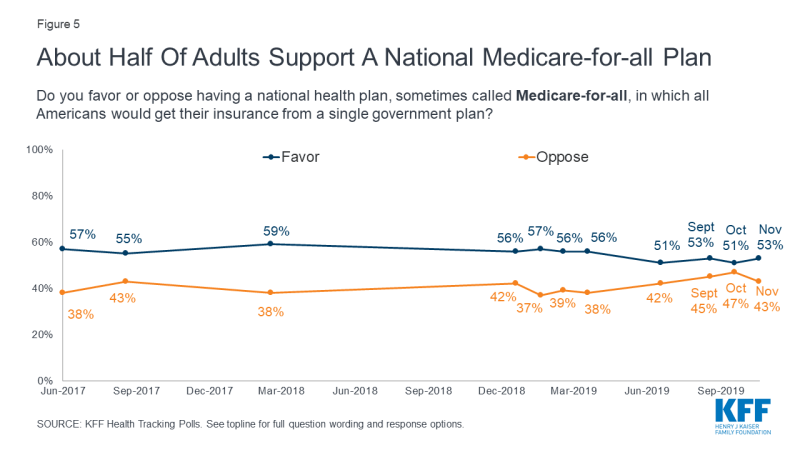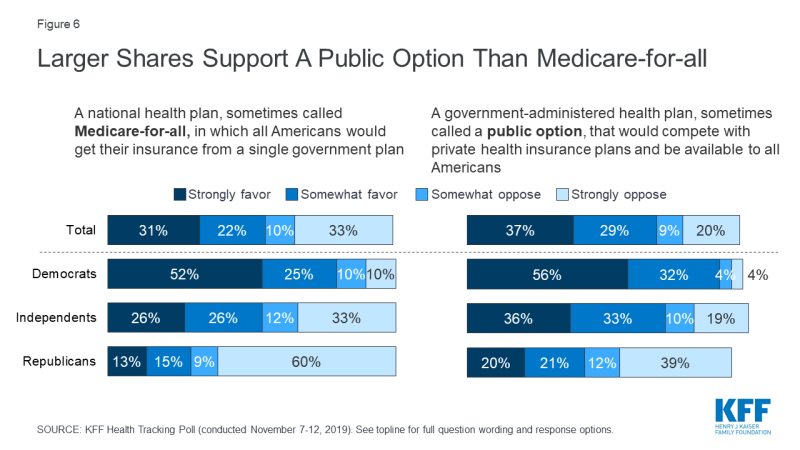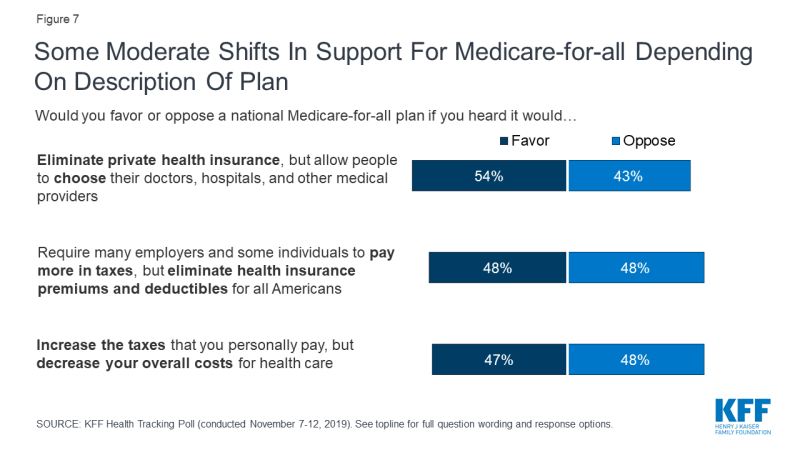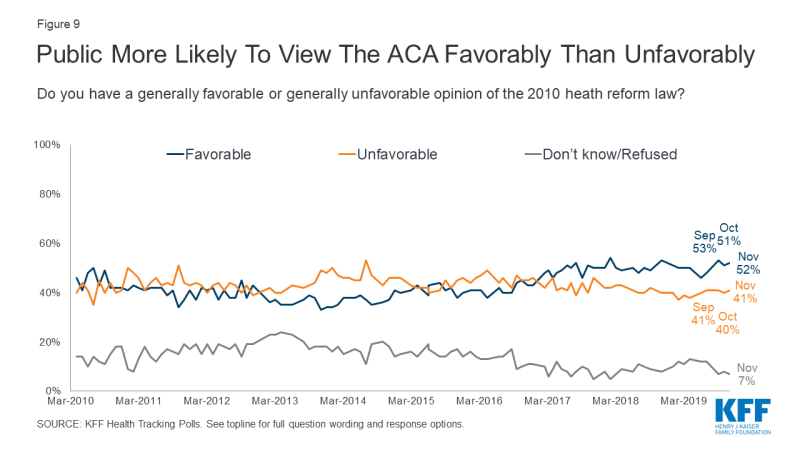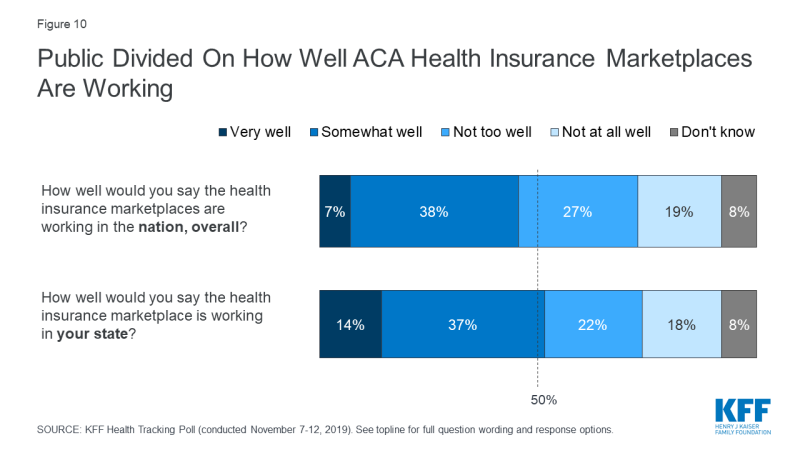KFF Health Tracking Poll – November 2019: Health Care In The 2020 Election, Medicare-for-all, And The State Of The ACA
Key Findings:
- Health care has been a dominant issue throughout the 2020 Democratic presidential primary and the latest KFF Health Tracking Poll finds Democrats continuing to prioritize health care over other issues. Ahead of tonight’s Democratic presidential debate, when asked to state in their own words the one issue they most want to hear the Democratic presidential candidates discuss, about one in four (24%) Democrats and Democratic-leaning independents offer health care. Fewer mention other issues such as the environment (12%), immigration (6%), jobs and the economy (5%), education (4%), and gun control (4%).
- Senator Bernie Sanders is the candidate most trusted on health care by Democrats and Democratic-leaning independents, though the Medicare-for-all plan he’s championed is significantly less popular than the “public option” approach put forward by some other candidates. Among adults overall, a narrow majority (53%) support the idea of a Medicare-for-all plan while a larger majority (65%) say they support a government-run public option that would compete with private insurance. Large majorities of Democrats support both a public option (88%) and Medicare-for-all (77%), and while most Republicans oppose both approaches to expanding coverage, more favor the public option proposal (41%) than a Medicare-for-all plan (27%).
- Attitudes towards a Medicare-for-all plan shift moderately depending on how such a proposal is described. For example, if the plan is described as requiring many employers and some individuals to pay more in taxes, but eliminating both out-of-pocket costs and premiums for all Americans, overall favorability drops to 48%. Similarly, overall favorability drops (47%) when the plan is described as increasing taxes individuals will personally pay, but decreasing their overall costs for health care.
- Senator Bernie Sanders leads the field when Democrats and Democratic-leaning independents are asked which Democratic presidential candidate they trust the most on health care. About three in ten (29%) say they trust Sen. Sanders, followed by about one-fifth who say they trust Vice President Joe Biden (21%) or Senator Elizabeth Warren (19%). Overall trust of Sanders on health care is largely driven by younger Democrats and Democratic-leaning independents as well as those who are not as connected to the Democratic Party. Nearly half (47%) of Democrats and Democratic-leaning independents between the ages of 18 and 34 prefer Sanders when it comes to health care, while Biden holds a sizeable edge over other candidates among adults 65 and older (33%). Among independents who lean Democratic, Senator Sanders is the preferred candidate (39%), while self-identified Democrats are split on which candidate they most trust to handle health care: Warren (26%), Biden (23%) and Sanders (22%).
- The 2020 open enrollment period for people who purchase their own insurance on the ACA marketplaces began in most states on November 1st. The law’s seventh open enrollment period began with the announcement that premiums in many areas of the U.S. are decreasing. Yet a plurality of the public (44%) thinks premiums are higher than they were last year. Though ACA marketplace premiums are now on average lower than they were last year, just 6% think this is the case.
Health Care and the 2020 Election
This month’s KFF Health Tracking Poll continues our analysis of the role health care may be playing in the 2020 election with a look at what issues Democrats want to hear about in the next debate as well as which of the Democratic primary candidates they trust the most when it comes to handling health care.
Democratic Presidential Primary Debates
Health care has been and remains a top issue for Democrats during the 2020 Democratic presidential primary. Recent KFF Health Tracking Polls have found that health care consistently emerges as a top issue that Democrats and Democratic-leaning independents want to hear the 2020 Democratic presidential candidates discuss, and this month’s poll finds this continues to be true. When asked to say in their own words what issue they would most like to hear the Democratic presidential candidates discuss in the upcoming debate, one in four Democrats and Democratic-leaning independents (24%) offer health care. This is twice as many as say they want to hear more about any other issue such as the environment (12%), immigration (6%), jobs and the economy (5%), education (4%), and gun control (4%).1
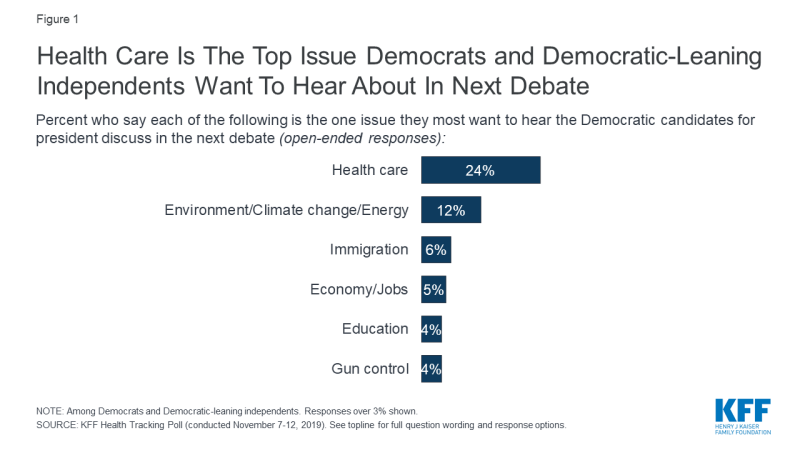
Figure 1: Health Care Is The Top Issue Democrats and Democratic-Leaning Independents Want To Hear About In Next Debate
And while various Democratic candidates have put out their own health care proposals, Democrats are still wanting to know more. Large shares say Democratic candidates are spending too little time talking about how their health care plans will affect older adults on Medicare (50%), how they will pay for their plans (47%), whether they will require higher taxes on the middle class (45%), and how they will work with Congress to pass their health care proposals (45%). About four in ten say the candidates are spending too little time discussing how they will lower health care costs for individuals (41%) and whether their plans would cover all U.S. residents (40%); and about a third say the candidates are spending too little time talking about how their plans differ from President Trump’s approach to health care.
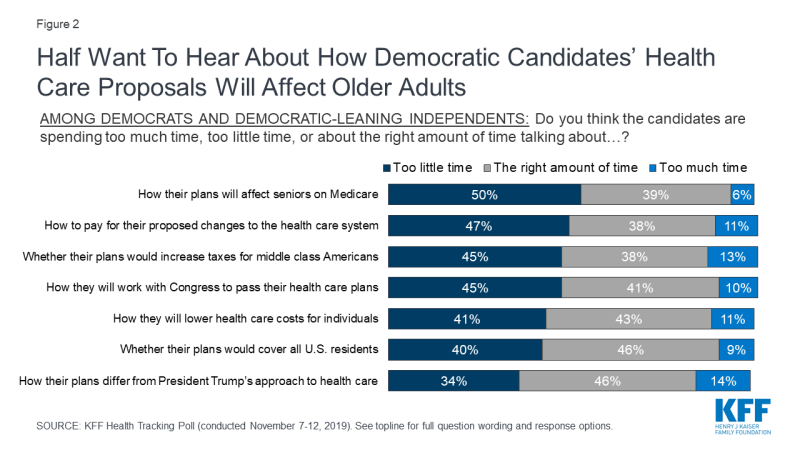
Figure 2: Half Want To Hear About How Democratic Candidates’ Health Care Proposals Will Affect Older Adults
Sanders, Biden, And Warren Are Most Trusted When It Comes To Health Care
When asked which candidate they trust the most when it comes to handling health care, nearly three in ten (29%) Democrats and Democratic-leaning independents say they are most trusting of Senator Bernie Sanders. About one in five say they are most trusting of former Vice President Joe Biden (21%) and Senator Elizabeth Warren (19%) when it comes to handling health care.
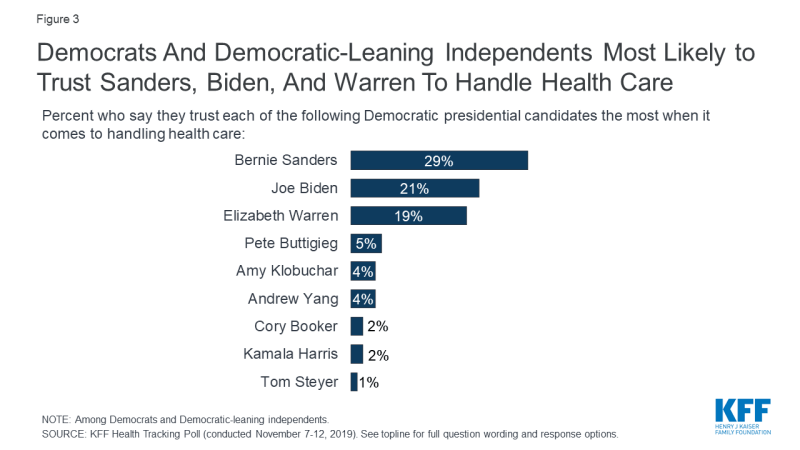
Figure 3: Democrats And Democratic-Leaning Independents Most Likely to Trust Sanders, Biden, And Warren To Handle Health Care
Notably, nearly half (47%) of younger Democrats and Democratic leaning independents, ages 18 to 34, say they have the most trust in Bernie Sanders when it comes to handling health care. However, among adults ages 65 and older, Joe Biden is the most trusted candidate to handle health care (33%).
| Table 1: Candidate Trust On Health Care By Age | ||||
| Percent who trust each of the following candidates the most when it comes to handling health care: | 18-34 year olds |
35-54 year olds |
55-64 year olds |
65 and older |
| Bernie Sanders | 47% | 26% | 9% | 16% |
| Joe Biden | 12 | 20 | 31 | 33 |
| Elizabeth Warren | 14 | 25 | 21 | 18 |
| Pete Buttigieg | 3 | 4 | 7 | 9 |
| Amy Klobuchar | 1 | 7 | 7 | 3 |
| Andrew Yang | 10 | 1 | 1 | 2 |
| Cory Booker | 3 | 3 | 2 | 0 |
| NOTE: Showing only candidates who received more than 2% among total Democrats and Democratic-leaning independents | ||||
When it comes to which candidate they most trust to handle health care, there are some notable differences between adults who identify as Democrats and those who identify as independents, but say they lean towards the Democratic party. Democrats are relatively divided with about one in four saying they most trust Elizabeth Warren (26%), Joe Biden (23%) and Bernie Sanders (22%). However, a larger share of Democratic-leaning independents (39%) choose Bernie Sanders as the most trusted candidate on health care than any of the other Democratic presidential candidates.
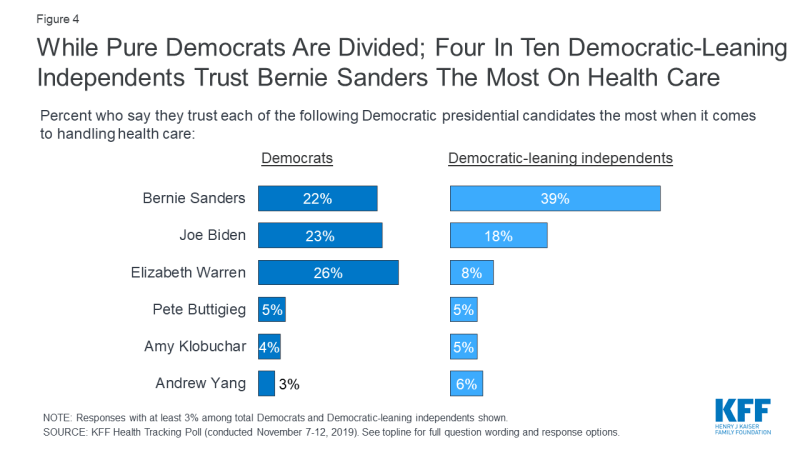
Figure 4: While Pure Democrats Are Divided; Four In Ten Democratic-Leaning Independents Trust Bernie Sanders The Most On Health Care
Medicare-for-all and Public Option
This month’s poll continues to find larger support for more incremental changes to the nation’s health care system than a major overhaul. Support for a “public option,” in which a government-administered plan would compete with private health insurance and be available to all Americans, has decreased slightly since last month. Two in three adults (65%) favor a public option, down from 73% in October. Levels of support for a public option were similar in July (65% support) and September (69%).
Following a narrowing of net support in recent months for Medicare-for-all, this month’s poll finds about half the public (53%) favors a national Medicare-for-all plan while 43% are opposed. Indeed, since July, support for Medicare-for-all has remained relatively steady with about half of adults in favor of the proposal.
Democrats and independents continue to be more likely than Republicans to favor both a public option and Medicare-for-all. Nonetheless, a public option that would compete with private health insurance plans garners more support among Republicans and independents than a proposed national Medicare-for-all plan. While large majorities of Democrats favor both proposals (77% Medicare-for-all, 88% public option), half of independents (52%) support a Medicare-for-all proposal compared to about seven in ten (69%) who support a public option. Among Republicans, 27% support a national Medicare-for-all plan while four in ten (41%) favor a public option.
Moderate Shifts in Support of a National Health Plan Depending On How The Plan Is Described
Previous KFF polling has found that attitudes towards a national Medicare-for-all plan are quite malleable when given counter-arguments. This month’s tracking poll finds more moderate shifts in the public’s views towards Medicare-for-all when they are provided descriptions that balance the trade-offs lawmakers are considering. When Medicare-for-all is described as eliminating private health insurance, but allowing people to choose their medical providers, support for Medicare-for-all remains relatively unchanged (54% favor v. 43% oppose). If the plan is described as requiring many employers and some individuals to pay more in taxes, but eliminating both out-of-pocket costs and premiums for all Americans, overall favorability drops and the public is equally divided (48% favor vs. 48% oppose) in their views. Similarly, the public is also divided when the plan is described as increasing taxes individuals will personally pay, but decreasing their overall costs for health care (47% favor vs. 48% oppose).
Additionally, about four in ten (39%) say a Medicare-for-all plan that would eliminate health insurance premiums, deductibles, and most out-of-pocket costs but would increase taxes on many employers and some individuals, will not have much financial impact on them. About a third of adults (34%) think they would be worse off under a Medicare-for-all plan while about one in five (22%) think they would be better off. Notably, half of adults 65 and older with Medicare coverage think they would not be financially impacted by a Medicare-for-all plan. Partisans have different expectations of how they would be financially impacted by a Medicare-for-all system which eliminated premiums and deductibles, but increased taxes on employers and some individuals. About half of Democrats (49%) and four in ten independents (40%) think they would not be impacted financially whereas half of Republicans (52%) think they would be worse off under a Medicare-for-all plan.
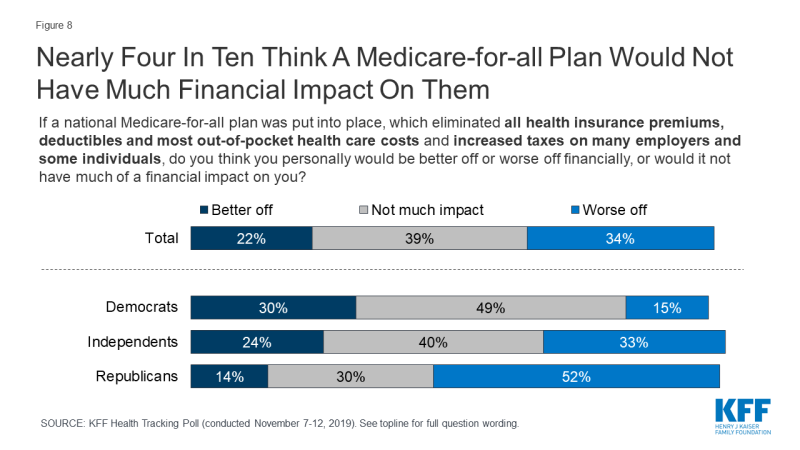
Figure 8: Nearly Four In Ten Think A Medicare-for-all Plan Would Not Have Much Financial Impact On Them
The Affordable Care Act’s Seventh Open Enrollment Period
Overall opinions of the Affordable Care Act (ACA) have remained relatively unchanged for the past two years since the Republican efforts to repeal the 2010 health care law. Half of the public (52%) this month hold favorable opinions of the ACA while four in ten (41%) hold a negative opinion of the law. Partisans remain divided on the ACA as eight in ten Democrats (83%) have a favorable view of the ACA compared to half of independents (52%) and about one in five Republicans (22%).
With the ACA open enrollment underway, millions of Americans will be using state and federal health insurance marketplaces, established by the 2010 health reform law, to shop for health insurance plans to cover them and their families in 2020. Americans are divided on how well they think the health insurance marketplaces are working in their own state and in the nation overall. When assessing how well the health insurance marketplaces in the nation are working, about four in ten (45%) say they are working “very well” (7%) or “somewhat well” (38%) while a similar proportion (47%) say they are working either “not too well” (27%) or “not at all well” (19%). The public is slightly more positive about how health insurance marketplaces are working in their state with half (52%) saying they are working either “very well” (14%) or “somewhat well” (37%).
Partisans are split on their views of how well the ACA health insurance marketplaces are working. Nearly six in ten Democrats (57%) say the marketplaces in the nation overall are working well and two-thirds (67%) say marketplaces in their state are working well. On the other hand, a majority of Republicans (56%) say marketplaces in the nation overall are not working well while about half (52%) say the marketplace in their state is not working well.
Notably, adults living in states that have developed their own state-based marketplace are more likely to say the health insurance marketplace in their own state is working well. About six in ten adults (58%) living in states with state-based marketplaces say the health insurance marketplace in their state is working well compared to half of those living in states that are using the federal marketplace (48%).
A recent KFF analysis of ACA marketplace premium data for 2020 has indicated that on average, premiums are decreasing across the U.S., though premium changes vary widely by location. Yet few adults think premiums for health insurance plans available in the ACA marketplaces are lower than they were last year. A plurality of the public (44%) think premiums are higher than they were last year while 6% think ACA marketplace premiums are now lower. About three in ten (29%) think the ACA premiums are about the same as last year.
While few partisans think the premiums for ACA plans are lower this year compared to last year, Republicans are more likely than Democrats to say the premiums are higher. Nearly half of Republicans (48%) say premiums in the ACA marketplaces are higher than they were last year compared to 37% of Democrats.
The Trump Administration’s Continuing Health Care Efforts
In December 2018, a federal district court judge in Texas issued a ruling siding with Republican state attorneys general that declared the Affordable Care Act invalid since Congress zeroed out the penalty for not having health insurance. The case is now with a panel of judges in the 5th Circuit Court of Appeals. A ruling is expected in the coming months and many expect the case to make its way to the U.S. Supreme Court.
Overall, 62% of the public do not want to see the Supreme Court overturn the ACA’s pre-existing condition protections; yet the public is more divided on whether they want the Supreme Court to overturn the entire law (45% would like to see it overturned and 48% would not). While 76% of Democrats and half of independents do not want to see the 2010 health care law overturned, seven in ten Republicans (71%) say they would like to see the Supreme Court overturn the law. However, far fewer Republicans (43%) want to see the ACA’s protections for people with pre-existing conditions overturned.
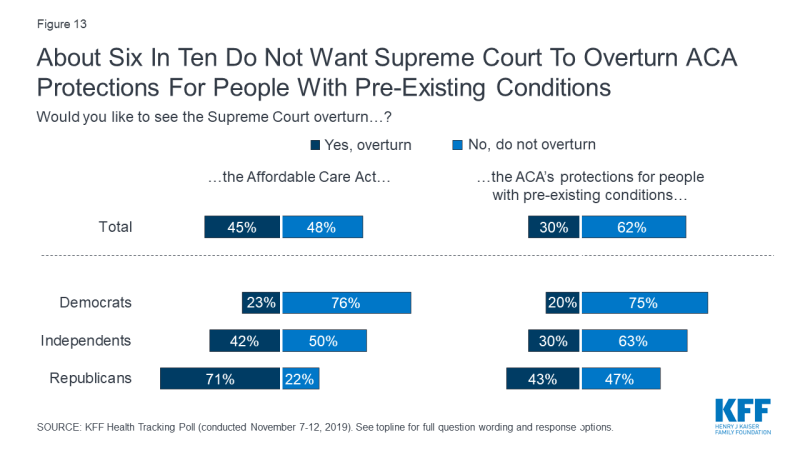
Figure 13: About Six In Ten Do Not Want Supreme Court To Overturn ACA Protections For People With Pre-Existing Conditions
Throughout 2019 lawmakers on both sides of the aisle have been working to address the cost of prescription drugs. Both the U.S. House of Representatives and the U.S. Senate have held hearings on this issue and both the Trump administration and House Speaker Nancy Pelosi have put forward proposals to address prescription drug costs. Despite these efforts to address the issue, majorities say that President Trump and his administration (70%), Democrats in Congress (75%) and Republicans in Congress (77%) are “not doing enough” to bring down the costs of prescription drugs.
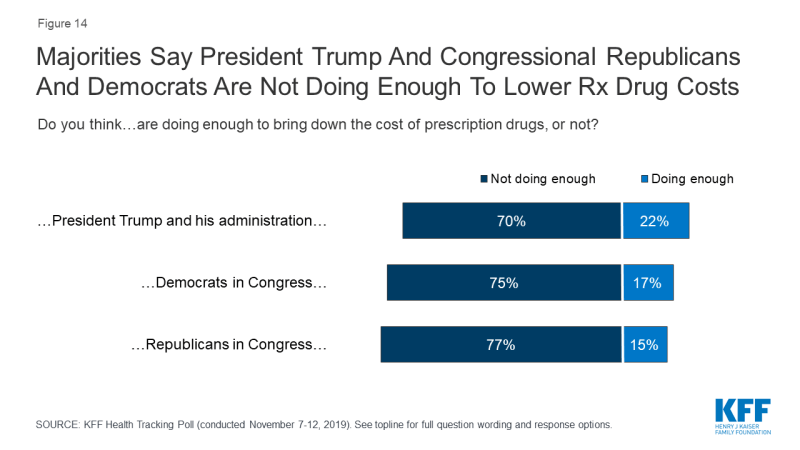
Figure 14: Majorities Say President Trump And Congressional Republicans And Democrats Are Not Doing Enough To Lower Rx Drug Costs
Notably, partisans appear to be critical of their own parties as a majority of Democrats (65%) say Congressional Democrats are “not doing enough” to bring down the costs of prescription drugs and a majority of Republicans (56%) say Congressional Republicans are “not doing enough.” Partisans are polarized on President Trump’s efforts to address prescription drugs costs with an overwhelming majority of Democrats (94%) and about eight in ten independents (77%) saying the Trump administration is “not doing enough,” compared to one-third of Republicans who say the same.
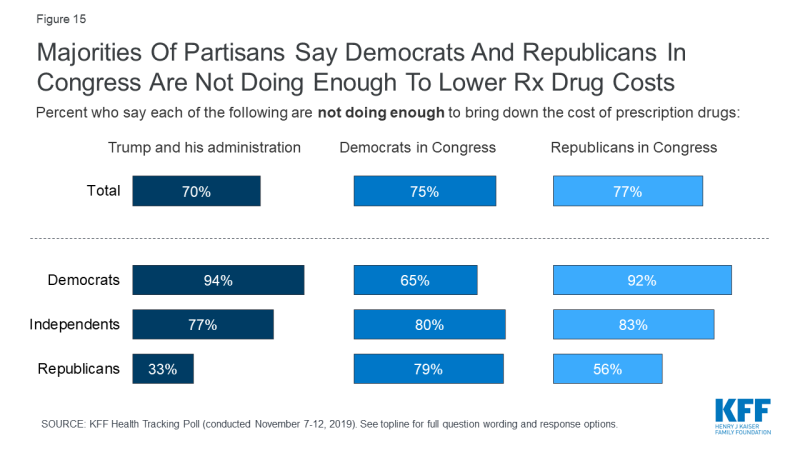
Figure 15: Majorities Of Partisans Say Democrats And Republicans In Congress Are Not Doing Enough To Lower Rx Drug Costs
Seven in ten adults (72%) —including majorities across partisans—think it is “not too likely” or “not at all likely” that Congress will pass legislation to lower the costs of prescription drugs in the next year.
If the public’s pessimism about the prospects of legislation to address prescription drug costs proves to be true, blame for the lack of results will be shared. Three in ten (30%) say they would blame Republicans if Congress does not pass legislation to lower the costs of prescription drugs, and a similar proportion (30%) would blame Democrats in Congress. One in four (25%) would place the blame on President Trump.

